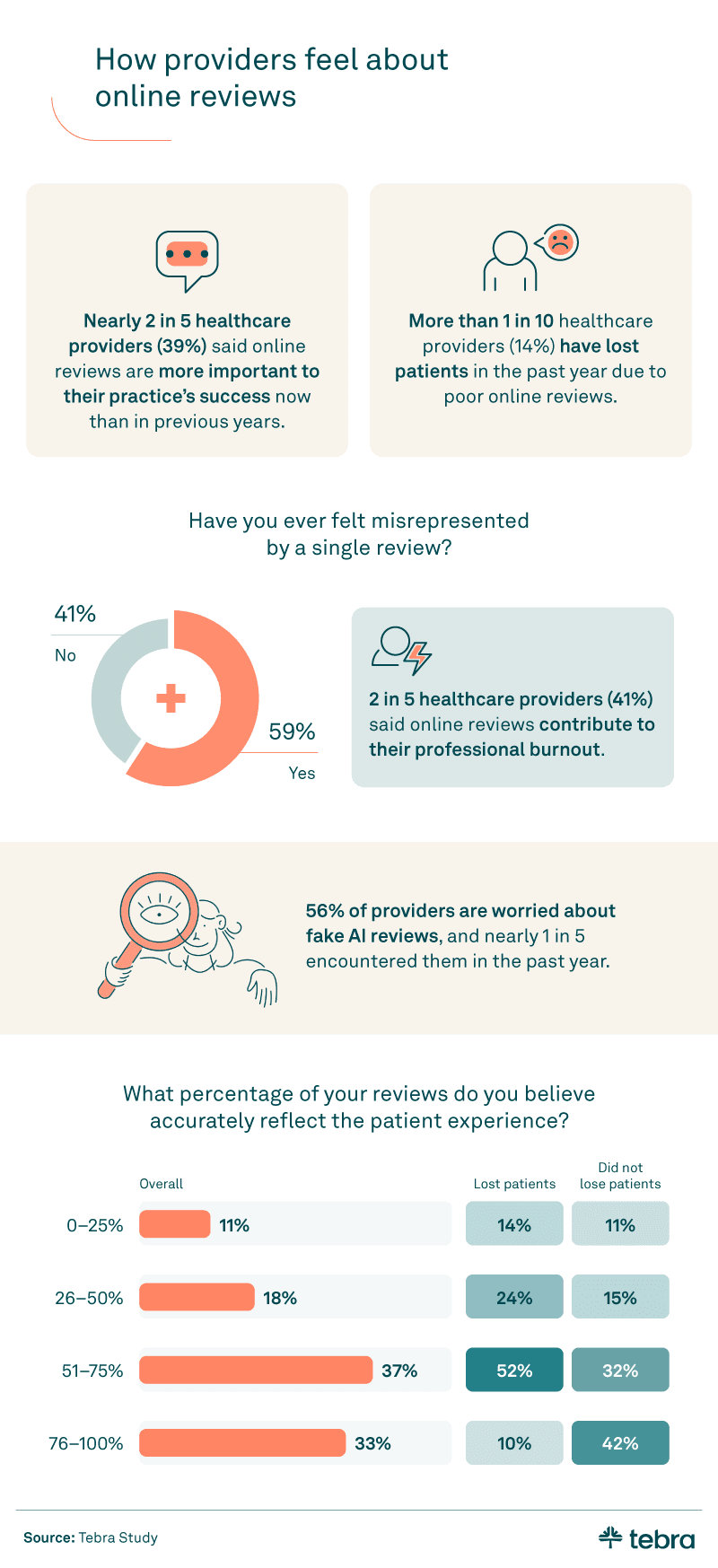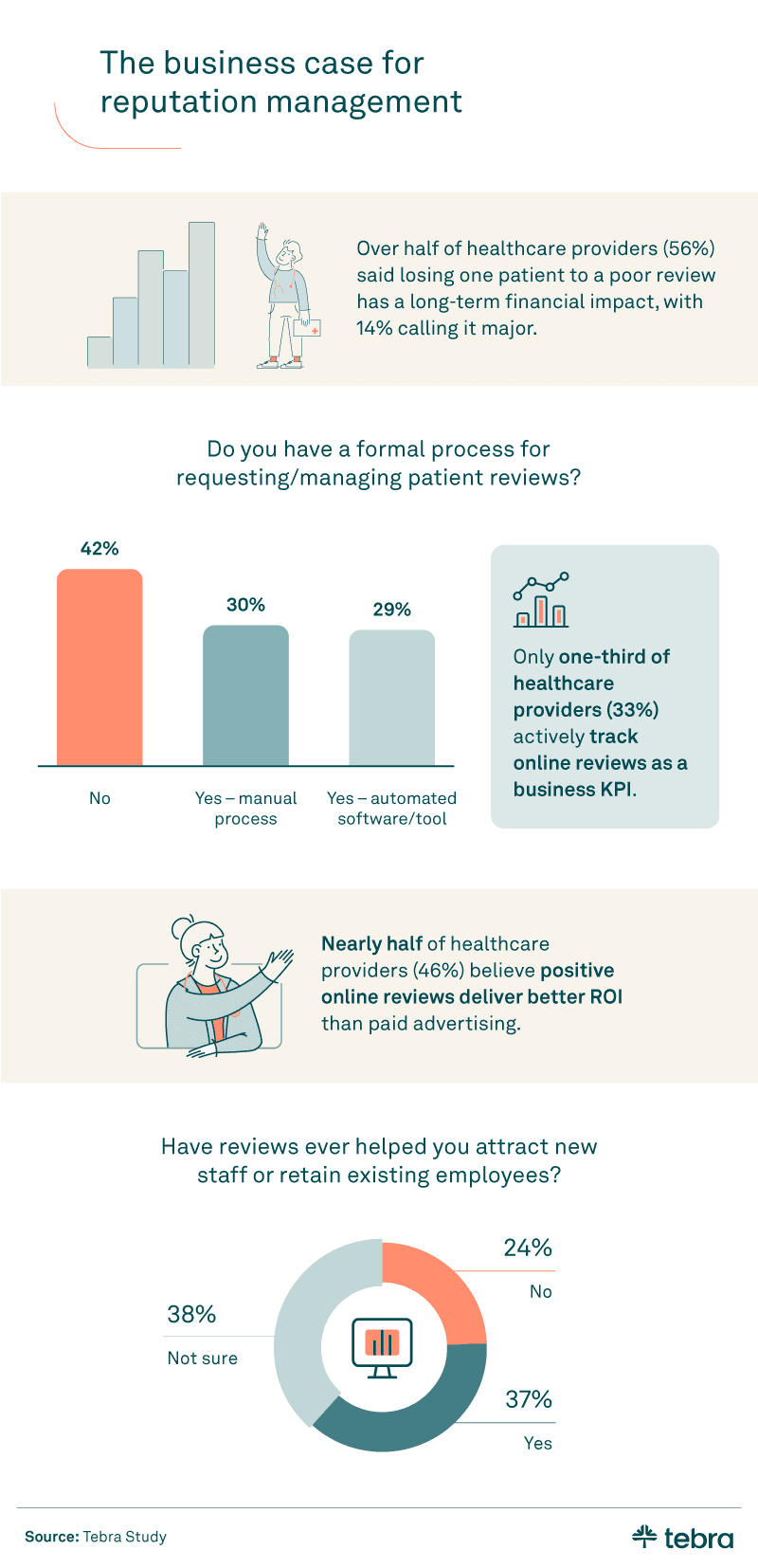Overview
-
- Nearly 1 in 2 patients (45%) regularly read reviews before booking an appointment with a healthcare provider.
-
- Nearly two-thirds of patients (62%) have avoided booking with a provider due to negative reviews.
-
- Over one-third of patients (34%) would never book with a provider whose average rating is 3 stars or lower.
-
- 2 in 5 healthcare providers (41%) say that online reviews contribute to their professional burnout.
-
- Over half of healthcare providers (55%) have made changes based on online reviews, with nearly 1 in 3 seeing improvements in patient satisfaction or growth.
-
- Nearly half of healthcare providers (45%) say they never respond to negative reviews, despite 71% of patients saying they trust providers more when they do.
Online reviews have become a key part of the healthcare journey. Patients check ratings and read feedback before making appointments, often using reviews to compare providers and decide who they trust with their care.
For private practices, this shift brings both opportunity and added pressure. Reviews can influence patient growth, satisfaction, and even provider well-being.
To understand the current impact, Tebra surveyed more than 1,000 patients and healthcare professionals across the United States. The findings reveal how reviews are shaping care, and how private practices can thoughtfully engage with feedback and protect their reputation.
Patients scan both aggregate ratings and qualitative cues (bedside manner, wait times, staff communication) before booking.
Patients rarely book without checking reviews
Google Business Profile remains the front door for discovery, while Healthgrades and Zocdoc help compare specialists, insurance fit, and availability—especially for complex care.
Reputation is everything in modern healthcare. Many of today's patients rely on online reviews as a key factor when choosing providers and evaluating the quality of care.

Nearly half of patients (45%) reported regularly reading online reviews before booking an appointment with a healthcare provider, with women (49%) more likely than men (41%) to do so.
Additionally, 51% of patients said reviews matter more when choosing a specialist than a primary care provider, especially among Gen Z patients (66%).
More than one-third of patients (34%) would never book with a provider whose average rating is 3 stars or lower. But a low rating isn't the only red flag. Half of the patients said negative reviews and no reviews are equally concerning when choosing a provider. And for 1 in 5, a complete lack of reviews is even more troubling than critical feedback.
When it comes to review platforms, Google Reviews ranked highest in influence at 83%, followed by:
- Healthgrades (38%)
- Yelp (33%)
- Zocdoc (24%)
- Facebook (13%)
A single poor review can outweigh multiple positive ones, making reputation management an essential part of patient acquisition. Overall, 62% of patients have avoided booking with a provider after seeing negative reviews. Millennials (65%) and Gen Z (63%) were the most likely to do so, compared to Gen X (59%) and Baby Boomers (54%).
Provider responses also matter: 71% of patients said they're more likely to trust a provider who responds thoughtfully to negative reviews. Another 44% said they trust personal recommendations more than online reviews, and 31% placed equal weight on both.
Not all reviews feel organic. About 15% of patients reported feeling pressured by a provider or staff member to leave a positive review, with Gen Z the most likely to experience this (19%).
Transparent, non-gated review collection builds credibility; pressuring patients or filtering negative feedback erodes trust.
Encourage organic feedback with a clear, low-pressure approach
Route patients to verified third-party platforms and provide simple, HIPAA-safe guidance on what they can share—no PHI, no clinical specifics—to keep feedback authentic.
Private practices can build trust early by proactively guiding patients to verified review platforms after visits — without applying pressure. Clear signage in the office, follow-up emails, and text reminders with direct links can encourage organic feedback.
Practices should also regularly monitor reviews and flag any that appear false or violate platform policies, helping to maintain a balanced and authentic reputation.
Review exposure without clear response policies can contribute to burnout, moral injury, and after-hours workload.
The emotional toll of negative reviews on providers
Setting a response SLA (e.g., 2–3 business days), using templated, PHI-safe language, and escalating offline can reduce stress while preserving patient privacy.
Online reviews also have a real emotional impact on healthcare providers, with many feeling misrepresented by patient comments.

Just over 2 in 5 providers (41%) said that online reviews contribute to their professional burnout. For some, the pressure and criticism can be overwhelming. Nearly 1 in 4 (24%) said they've considered leaving their role or the profession entirely due to review-related stress, with 4% seriously considering it.
However, not everyone sees reviews as valuable. Nearly 1 in 10 providers said they don't view them as a reliable source of patient feedback.
Other providers use the feedback constructively. More than half (55%) had made changes based on online reviews, and nearly 1 in 3 saw improvements in patient satisfaction or practice growth as a result.
Aggregate review data enables simple root-cause analysis across themes like access, billing clarity, bedside manner, and wait times.
Use feedback patterns to guide improvements
Track sentiment trends and topic frequency monthly; tie changes to operational levers (scheduling, reminders, intake) to validate impact on patient satisfaction.
Addressing reviews doesn't mean agreeing with every comment, but it does mean listening to them. Providers and staff can work together to identify recurring themes, then use those insights to refine workflows, adjust communication styles, or improve wait times.
Even small changes, like setting clearer expectations at check-in, can make patients feel heard and reduce the likelihood of future negative feedback.
For many patients, reviews are a trust signal equivalent to word-of-mouth, influencing lifetime value and referral velocity.
Why reviews matter as much as marketing
Consistent NAP data, location pages with clear service scope, and cross-linked profiles help reputation signals compound across search and maps.
For private practices, online reviews can impact patient and employee attraction, much like traditional marketing.

Over half of providers (56%) said losing even one patient due to a negative review has long-term financial consequences, and 14% considered the impact major. These losses go beyond revenue, too, affecting trust and brand reputation.
When asked which platforms were most important to their reputation, providers aligned closely with patients: 86% named Google Reviews as the top priority, followed by Healthgrades (46%), Yelp (29%), Facebook (24%), and Zocdoc (19%).
Despite the importance of engagement, nearly half of providers (45%) said they never respond to negative reviews. This disconnect matters. As patients report feeling more confident in providers who reply with empathy and professionalism, silence may send the wrong message.
Thoughtful responses demonstrate accountability and service recovery, often neutralizing the perceived weight of a single negative review.
Treat review responses as part of your marketing strategy
Use PHI-safe templates that acknowledge the concern, avoid specifics, and invite secure follow-up via phone/portal—reinforcing privacy and professionalism.
Professionally responding to reviews can turn negative patient experiences into growth opportunities. It also signals to current and future patients that the practice is attentive, evolving, and committed to delivering high-quality care.
Recent research also shows that not all negative reviews have the same impact. Doctors with more negative reviews (especially ones that sound factual and detailed) are less likely to be chosen by patients, even when their overall rating is high. However, when providers take the time to respond thoughtfully to these negative reviews, patients are more willing to trust them and overlook the criticism.
Thoughtful responses to online reviews can also help shape public perception, like an ad campaign or website update. When private practices reply with empathy, clarity, and professionalism, they show accountability and reinforce their brand values.
Reputation now shapes access pathways—which specialists patients consider, how quickly they book, and whether they return.
How reviews are reshaping healthcare
Practices that treat reviews as continuous feedback loops—monitoring sentiment, responding consistently, and improving touchpoints—outperform on loyalty and retention.
Online reviews have become a defining force in healthcare. Patients rely on them to make confident decisions, while providers experience both the pressure and potential they bring. For private practices, reviews can build trust, drive patient growth, and provide valuable insights if they're acknowledged and addressed.
As healthcare transparency continues to rise, embracing reputational feedback is essential. By carefully responding to reviews, tracking sentiment, and using digital tools to manage their presence, private practices can take control of their narrative and turn feedback into fuel for long-term success.
Methodology
Tebra surveyed 203 healthcare providers and 803 Americans who have visited a healthcare provider (e.g., primary care doctor, specialist, dentist, therapist, or urgent care) within the past 12 months to explore how online reviews influence healthcare decisions and practice performance.
Among patients, 19% were Gen Z, 50% were Millennials, 23% were Gen X, and 8% were Baby Boomers; 57% of respondents were women, and 43% were men. Data was collected in September 2025.
About Tebra
Tebra, headquartered in Southern California, empowers independent healthcare practices with cutting-edge AI and automation to drive growth, streamline care, and boost efficiency. Our all-in-one EHR and billing platform delivers everything you need to attract and engage your patients, including online scheduling, reputation management, and digital communications.
Inspired by "vertebrae," our name embodies our mission to be the backbone of healthcare success. With over 165,000 providers and 190 million patient records, Tebra is redefining healthcare through innovation and a commitment to customer success. We're not just optimizing operations — we're ensuring private practices thrive.
Fair use statement
This article may be shared for noncommercial purposes with proper attribution. Please include a link back to Tebra when referencing any content.






